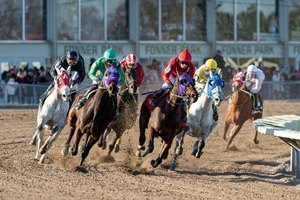Nebraska Aiming for Expanded Racing, Breeding Programs


With casino legislation tied to the state's racetracks approved in 2020, Nebraska will be looking to significantly increase its Thoroughbred dates in the coming years and hopes renewed interest in breeding in the state will help supply the horses needed for those events.
A 139-page report titled Gaming and Horseracing Market Analysis and Socioeconomic Study, State of Nebraska, which was requested by the Nebraska Racing and Gaming Commission and released last month by The Innovation Group, examines 2031 requirements for minimum Thoroughbred racing dates under the casino legislation.
For the 2031 racing season, the report calls for 280 races at Fonner Park, 135 at the Columbus Exposition and Racing, and a combined 650 races at three other tracks in the state. That would add up to 865 races in the state in 2031, more than doubling the 402 races contested in the Cornhusker State in 2023.
The report notes that the state will need to fill at least 111 races for Nebraska-breds by 2031, projecting a need for 208 Nebraska-bred starters assuming those runners average four starts in the year. This will require an uptick in breeding in the state—although since the casino legislation passed, there already has been some improvement in this area. In 2021 there were 106 mares bred that produced 70 Nebraska-bred foals, more than double the 33 produced in 2018.
The report notes that the addition of gaming revenue to the Nebraska breeding industry will encourage additional activity. It notes that a breeding fund of 1% of gaming revenue at the Thoroughbred tracks would generate more than $3 million annually based on gaming market analysis results. That amount would be 10 times the amount currently generated by pari-mutuel funding.
At a minimum, the report said the state will need at least an additional 44 mares bred each year. It then noted, "In a more realistic scenario, the state would be looking at a foal and mare increase of 79 (61%) by 2027 to have sufficient horses for the 2031 season."
While the report projects a 20% increase in starts by out-of-state runners, it notes that goals should focus on improving racing and breeding in the state.
"States that have implemented gaming to enhance the racing industry have generally had more success in improving their own in-state industry versus attracting large increases in starts and starters from other states," the report summarized in its section devoted to looking at Thoroughbred racing and breeding. "While this is good news for the Nebraska Thoroughbred Breeders Association, it also creates pressure on the Nebraska industry to produce enough horses to field the majority of the runners for the 865 races forecast for 2031, which represents the bare statutory minimum of race days for three of the five Thoroughbred licensees, along with an extra five days proposed by (Columbus) and an extra 15 days at Legacy Downs (a license-holding track in Lincoln)."
Currently, only one of the five licensed Thoroughbred tracks, Fonner Park, operates a full racing schedule. But the report said the remaining tracks "have more than ample space capacity to accommodate a fourfold growth in racing."
